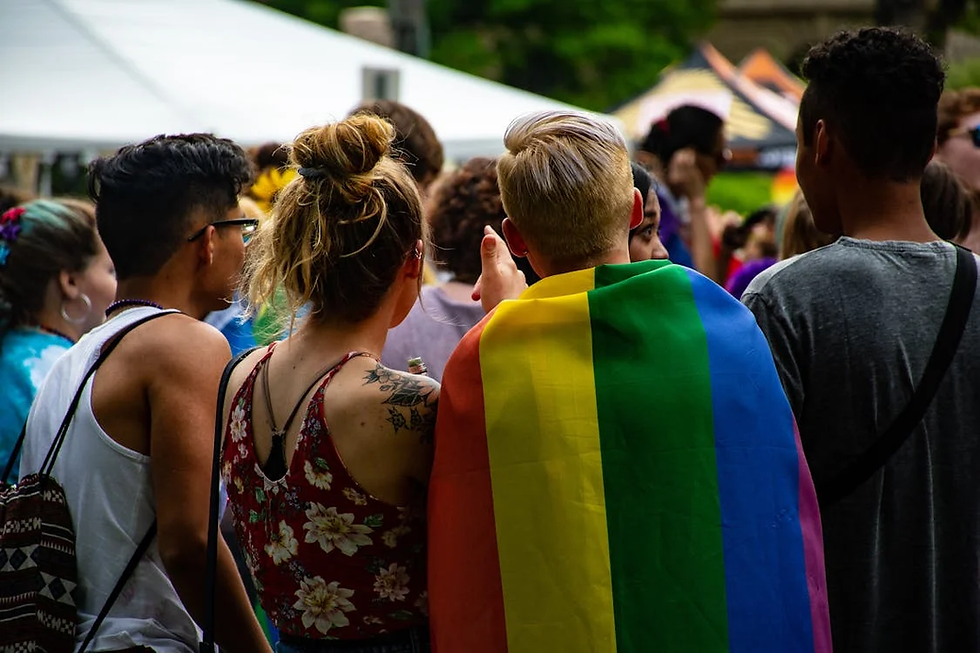Campaigns to Abolish Conversion Therapy in the UK
- Hannah McGaw

- Mar 9, 2021
- 3 min read
Updated: Dec 23, 2024
Conversion therapy (or ‘cure’ therapy as it is otherwise known) refers to any form of treatment that aims to change a person’s sexuality, or aims to suppress a person’s gender identity. It is based on an outdated assumption that being LGBTQ+ is a mental illness that can be ‘cured’.
In 2017, all major psychotherapy and health bodies, charities, and organisations (including the NHS), concluded that conversion therapy is dangerous. These institutions have condemned the practice of conversion therapy by signing a Memorandum of Understanding. Following this, the Church of England also passed a motion condemning the practice of conversion therapy, and calling on the government to ban it- a plea which has now been echoed by over three hundred and seventy global religious leaders.

However, in the UK, there are no direct laws making Conversion Therapy illegal. As of 2021, only seven countries have any direct legislation - at either a national or regional level - outlawing the practice. The United States, Canada, Australia, and Spain all have regional laws preventing conversion therapy, and there are five countries - Argentina, Uruguay, Samoa, Fiji, and Naura - that also have indirect bans.
Almost a year ago, in July, Boris Johnson said that the practice was “absolutely abhorrent”, and that plans for a ban would be brought forward. The government commissioned research into the ban, which was first proposed by Theresa May in 2018. However, no ministers or private research facilities have published any details on subsequent steps taken.
Equalities Minister Kemi Badenoch said the government is “committed” to “ending” conversion therapy, and that they take the issue “very seriously”. However, campaigners and many MPs believe more targeted action is necessary.
In recent weeks, campaigners have accused the government of not moving quickly enough towards banning LGBTQ+ ‘cure therapy’ in England and Wales. MPs from across the political spectrum called for the practice to be made illegal during a Westminster debate on the 8th of March.
The Monday debate was prompted by a petition signed by more than 256,000 signatures. The petition states: “I would like the Government to: make running conversion therapy in the UK a criminal offence, forcing people to attend said conversion therapies a criminal offence, sending people abroad in order to try to convert them a criminal offence and protect individuals from conversion therapy.”
It continues, “Despite all major counselling and psychotherapy bodies in the UK, including the NHS, condemning LGBT conversion therapy, it is still legal and LGBT individuals in the UK are still exposed to this psychological and emotional abuse to this day. The very thought of this sickens me, and I would like to see it stopped one day.”
To earn a response from the government in the UK, a petition needs 10,000 signatures; to be considered for a debate in Parliament, 100,000 signatures are needed. Once the ten-thousand milestone was reached, the government replied with: “The Government is committed to ensuring all citizens feel safe and protected from harm. We will work to deepen our understanding and consider all options for ending the practice of conversion therapy.”
Many campaigners were not satisfied. They have since called on the government to produce a strict timeline for the legislation.
Conservative MP Elliot Colburn, who argued for the ban in the debate, stated that: “a ban must cover both the public and the private spheres and all forms of intervention, no matter what they might be, whether that be healthcare, religious, cultural or traditional, and so on. It must cover children and adults, those who have been coerced and indeed those who consented to such conversion practices.” He then argued: ‘The ban cannot be just on gay conversion therapy. It must cover degrading and inhumane interventions aimed at changing anyone’s sexual orientation, or gender identity or expression’.
Following the debate, the Ozanne Foundation, which campaigns against discrimination based on sexuality and gender identity, said: ‘The UK government has constantly dragged its feet on taking any meaningful action, allowing perpetrators to flourish during their continued silence’ and that ‘the response from the ministers told us nothing new.”
Former Scotland Secretary David Mundell (who is the Conservative Party's first openly gay cabinet minister) said conversion therapy cannot be tolerated. He added that the government had “given the impression of being tardy”: a view seemingly shared by many campaigners.
Watch the debate here:
Read the debate Transcript:

_edited.png)
Comments